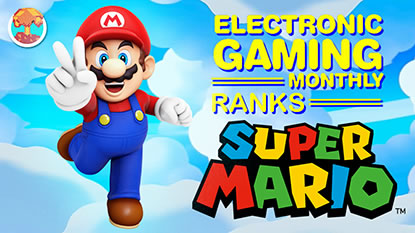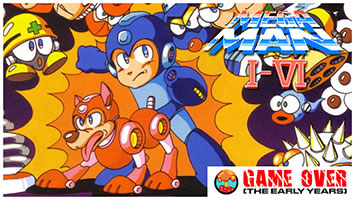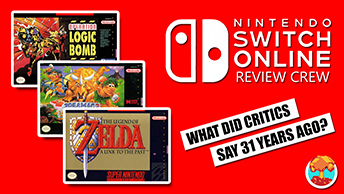- CLASSIC MAGAZINES
- REVIEW CREW
A show recapping what critics thought back
when classic games first came out! - NEXT GENERATION'S BEST & WORST
From the worst 1-star reviews to the best
5-stars can offer, this is Next Generation! - NINTENDO POWER (ARCHIVE)
Experience a variety of shows looking at the
often baffling history of Nintendo Power! - MAGAZINE RETROSPECTIVE
We're looking at the absolutely true history of
some of the most iconic game magazines ever! - SUPER PLAY'S TOP 600
The longest and most ambitious Super NES
countdown on the internet! - THEY SAID WHAT?
Debunking predictions and gossip found
in classic video game magazines! - NEXT GENERATION UNCOVERED
Cyril is back in this spin-off series, featuring the
cover critic review the art of Next Generation! - HARDCORE GAMER MAGAZING (PDF ISSUES)
Download all 36 issues of Hardcore Gamer
Magazine and relive the fun in PDF form!
- REVIEW CREW
- ELECTRONIC GAMING MONTHLY
- ELECTRONIC GAMING MONTHLY RANKS
From Mario to Sonic to Street Fighter, EGM
ranks classic game franchises and consoles! - ELECTRONIC GAMING MONTHLY BEST & WORST
Counting down EGM’s best and worst reviews
going year by year, from 1989 – 2009! - ELECTRONIC GAMING BEST & WORST AWARDS
11-part video series chronicling the ups and
downs of EGM’s Best & Worst Awards!
- ELECTRONIC GAMING MONTHLY RANKS
- GAME HISTORY
- GAME OVER: STORY BREAKDOWNS
Long-running series breaking down game
stories and analyzing their endings! - A BRIEF HISTORY OF GAMING w/ [NAME HERE]
Real history presented in a fun and pithy
format from a variety of game historians! - THE BLACK SHEEP
A series looking back at the black sheep
entries in popular game franchises! - INSTANT EXPERT
Everything you could possibly want to know
about a wide variety of gaming topics! - FREEZE FRAME
When something familiar happens in the games
industry, we're there to take a picture! - I'VE GOT YOUR NUMBER
Learn real video game history through a series
of number-themed episodes, starting at zero! - GREAT MOMENTS IN BAD ACTING
A joyous celebration of some of gaming's
absolute worst voice acting!
- GAME OVER: STORY BREAKDOWNS
- POPULAR SHOWS
- DG NEWS w/ LORNE RISELEY
Newsman Lorne Riseley hosts a regular
series looking at the hottest gaming news! - REVIEW REWIND
Cyril replays a game he reviewed 10+ years
ago to see if he got it right or wrong! - ON-RUNNING FEUDS
Defunct Games' longest-running show, with
editorials, observations and other fun oddities! - DEFUNCT GAMES QUIZ (ARCHIVE)
From online quizzes to game shows, we're
putting your video game knowledge to the test!- QUIZ: ONLINE PASS
Take a weekly quiz to see how well you know
the news and current gaming events! - QUIZ: KNOW THE GAME
One-on-one quiz show where contestants
find out if they actually know classic games! - QUIZ: THE LEADERBOARD
Can you guess the game based on the classic
review? Find out with The Leaderboard!
- QUIZ: ONLINE PASS
- DEFUNCT GAMES VS.
Cyril and the Defunct Games staff isn't afraid
to choose their favorite games and more! - CYRIL READS WORLDS OF POWER
Defunct Games recreates classic game
novelizations through the audio book format!
- DG NEWS w/ LORNE RISELEY
- COMEDY
- GAME EXPECTANCY
How long will your favorite hero live? We crunch
the numbers in this series about dying! - VIDEO GAME ADVICE
Famous game characters answer real personal
advice questions with a humorous slant! - FAKE GAMES: GUERILLA SCRAPBOOK
A long-running series about fake games and
the people who love them (covers included)! - WORST GAME EVER
A contest that attempts to create the worst
video game ever made, complete with covers! - LEVEL 1 STORIES
Literature based on the first stages of some
of your favorite classic video games! - THE COVER CRITIC
One of Defunct Games' earliest shows, Cover
Critic digs up some of the worst box art ever! - COMMERCIAL BREAK
Take a trip through some of the best and
worst video game advertisements of all time! - COMIC BOOK MODS
You've never seen comics like this before.
A curious mix of rewritten video game comics!
- GAME EXPECTANCY
- SERIES ARCHIVE
- NINTENDO SWITCH ONLINE ARCHIVE
A regularly-updated list of every Nintendo
Switch Online release, plus links to review! - PLAYSTATION PLUS CLASSIC ARCHIVE
A comprehensive list of every PlayStation
Plus classic release, including links! - RETRO-BIT PUBLISHING ARCHIVE
A regularly-updated list of every Retro-Bit
game released! - REVIEW MARATHONS w/ ADAM WALLACE
Join critic Adam Wallace as he takes us on a
classic review marathon with different themes!- DEFUNCT GAMES GOLF CLUB
Adam Wallace takes to the links to slice his way
through 72 classic golf game reviews! - 007 IN PIXELS
Adam Wallace takes on the world's greatest spy
as he reviews 15 weeks of James Bond games! - A SALUTE TO VAMPIRES
Adam Wallace is sinking his teeth into a series
covering Castlevania, BloodRayne and more! - CAPCOM'S CURSE
Adam Wallace is celebrating 13 days of Halloween
with a line-up of Capcom's scariest games! - THE FALL OF SUPERMAN
Adam Wallace is a man of steel for playing
some of the absolute worst Superman games! - THE 31 GAMES OF HALLOWEEN
Adam Wallace spends every day of October afraid
as he reviews some of the scariest games ever! - 12 WEEKS OF STAR TREK
Adam Wallace boldly goes where no critic has
gone before in this Star Trek marathon!
- DEFUNCT GAMES GOLF CLUB
- DAYS OF CHRISTMAS (ARCHIVE)
Annual holiday series with themed-episodes
that date all the way back to 2001!- 2015: 30 Ridiculous Retro Rumors
- 2014: 29 Magazines of Christmas
- 2013: 29 Questionable Power-Ups of Christmas
- 2012: 34 Theme Songs of Christmas
- 2011: 32 Game Endings of Christmas
- 2010: 31 Bonus Levels of Christmas
- 2009: 30 Genres of Christmas
- 2008: 29 Controls of Christmas
- 2007: 34 Cliches of Christmas
- 2006: 33 Consoles of Christmas
- 2005: 32 Articles of Christmas
- 2004: 31 Websites of Christmas
- 2003: 29 Issues of Christmas
- 2002: 28 Years of Christmas
- 2001: 33 Days of Christmas
- NINTENDO SWITCH ONLINE ARCHIVE
- REVIEW ARCHIVE
- FULL ARCHIVE
And That's Why CNN Hates Us
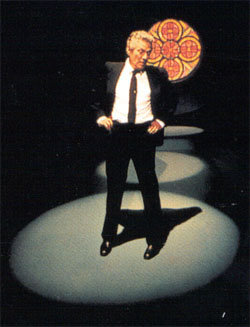
"You've got to say, 'I'm a HUMAN BEING, Goddamnit! My life has VALUE!' So I want you to get up now. I want you to get up right now and go to the window. Open it, and stick your head out, and yell: I'M MAD AS HELL AND I'M NOT GOING TO TAKE THIS ANYMORE!"
The problem is not that the media hates us; it's not as simple as that. Not only are we dealing with people that choose not to understand us, but they go out of their way to mischaracterize the video game industry every step of the way. Some of it they do knowingly, but most of the time it comes down to the simple generational gap that has fueled many fires over many centuries.
The problem comes down to the fact that your local news just doesn't know how to cover video game-related events. No matter what the story

What has Wolf Blitzer done for us lately?
You don't have to search for too long to see this theme put to use. Think back

If you can't figure out that Grand Theft Auto isn't intended for children than how can we trust you to tell us the truth about the stuff that really matters?
Yet these facts seemed to pass right by Hillary Clinton, Brit Hume, and Wolf Blitzer. The media tore Rockstar Games apart for featuring fully clothed sex hidden in the game, because the children who weren't supposed to be playing the game in the first place might witness some action. And it's
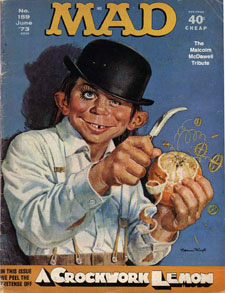
It seems crazy now, but there once was a time when Mad Magazine was considered pornographic by the mainstream media!
This generational gap has reared its ugly head before, and it's no surprise that art triumphs over ignorance. When hip hop and rap ruled the street the media rallied against it with the same avidity they use these days to cover terrorism. And during the height of the Vietnam War the media's bull's eye was on rock 'n roll. And let's not forget that many still consider Mad Magazine to be over the line of decency. The list goes on and on, the only constant is that what is acceptable is always changes. Let's not forget that many of these newscasters who misrepresent the video game public are the same people who grew up in a time when playing Cowboys and Indians wasn't considered racist.
The real crime here is that the people that purport to be journalists aren't doing their job when talking about video games. How difficult would it be to look up game buying habits? Certainly there must be studies out there that offer

If Deborah Norville can't take the time out of her busy life to look up the facts about video game players then maybe we're all doomed!
Study after study shows that most video games aren't bought by young kids (or even the tweeners), instead we see that it's people in their twenties that buy (and play) the most games. The largest segment of gamers are those twenty-somethings that grew up playing games when it really was child's play. But like the fans, the video game industry has grown and matured, and these days you have games meant for adults, children, and everybody in between. Yet it would seem as though the media is stuck back in the days of Pac-Man, Super Mario Bros., and Asteroids.
But don't let this stuff get down; these are just the growing pains that all forms of entertainment have to go through. When it comes right down to it the older generation never understands what the youth is up to, before long people have molded an opinion that they will stick with until they die. When movies were first invented fans of the

Adorable as she may be, this young girl does not represent all video game players!
To prove this theory we turn to a surprising source, The Simpsons. This long-running Fox cartoon had a hard time booking Hollywood talent to make cameos in their first few seasons. Matt Groening laments in nearly every DVD box set that actors of a certain age simply refuse to perform on The Simpsons, they act as if it's just a children's show and it's below them. Even after 17 seasons there are still people who think that they are above some animated TV show, despite the fact that it is one of the longest running television shows of all time (not to mention the longest running animated show ever). Matt believes that once somebody has made up their mind about you there's almost nothing you can do to reverse their opinion. And that, unfortunately, is exactly what we're dealing with in the video game industry.
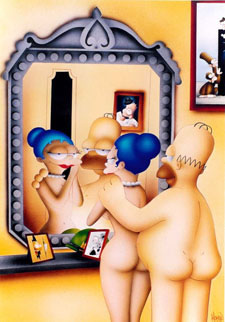
Oh yeah, that's just what this article needs ... Simpsons nudity!!
It's easy to see this bias when the media reports on video game violence or sex, but it's even apparent when they are talking about the benefits of playing games. Recently my local news reported on a study that showed that doctors who game end up being better all around surgeons. Instead of simply reporting this news the newscaster said, "Well Frank, I'm sure all of the young boys out there will be happy to know that all that practice is going towards something good."
When the Xbox 360 launched last November it got a lot of play on the 24 hour cable news networks (CNN, MSNBC, Fox News, etc.). For the most part the reporters were nice to Microsoft, but just about every one of them made some comment about how you should get the "kids" away from the television or that it might be something to get your "young teens." One person on CNN went as far as to ask how "children" were going to be able to afford a $400 system with $60 games. The media just doesn't get it.
HOME |
CONTACT |
NOW HIRING |
WHAT IS DEFUNCT GAMES? |
NINTENDO SWITCH ONLINE |
RETRO-BIT PUBLISHING
Retro-Bit |
Switch Planet |
The Halcyon Show |
Same Name, Different Game |
Dragnix |
Press the Buttons
Game Zone Online | Hardcore Gamer | The Dreamcast Junkyard | Video Game Blogger
Dr Strife | Games For Lunch | Mondo Cool Cast | Boxed Pixels | Sega CD Universe | Gaming Trend
Game Zone Online | Hardcore Gamer | The Dreamcast Junkyard | Video Game Blogger
Dr Strife | Games For Lunch | Mondo Cool Cast | Boxed Pixels | Sega CD Universe | Gaming Trend
Copyright © 2001-2025 Defunct Games
All rights reserved. All trademarks are properties of their respective owners.
All rights reserved. All trademarks are properties of their respective owners.













